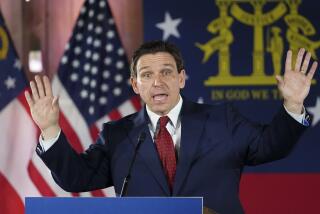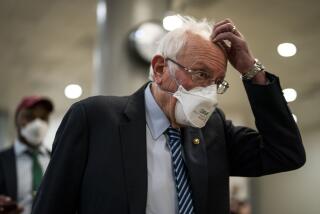Edwards Makes His Candidacy Official
- Share via
ROBBINS, N.C. — Evoking his small-town roots, Sen. John Edwards of North Carolina formally announced his bid for the Democratic presidential nomination Tuesday with a populist broadside against President Bush and a pledge to “make opportunity the birthright of every single American.”
Standing outside a textile mill where his father had worked, Edwards said that as president he would “be a champion for regular people every single day.”
In contrast, he painted Bush as a servant of lobbyists and special interests who gives “free rein to his friends at the expense of the country.”
“George Bush’s guiding principle is a twisted reflection of the American bargain: Instead of ‘opportunity for all, special privileges for none,’ he’s given us ‘opportunity for all the special interests,’ ” Edwards told an enthusiastic crowd that gathered outside the mill, now closed, in the rural town of 1,200 where he was raised.
Edwards’ populist rhetoric came despite the fact that he was a wealthy plaintiff’s attorney before his election to the Senate in 1998. But, as he has throughout his career, Edwards on Tuesday presented himself as a product of the middle class who was the first in his family to attend college and then used his law degree to represent “the kind of people I grew up with ... against HMOs and insurance companies.”
“I have spent my life working for people against those special interests,” he declared.
Christine Iverson, spokeswoman for the Republican National Committee, was dismissive of Edwards’ criticism and the status of his campaign. “After opening more than a dozen offices in Iowa, spending almost a million dollars in television advertising and [driving] thousands of miles introducing himself to voters, Sen. Edwards has failed to make any meaningful progress in the race,” she said.
Edwards, 50, has been running for president since January, when he announced the formation of an exploratory committee. His campaign has proved something of an enigma to political professionals.
He has raised money effectively and won positive reviews from many audiences during intensive grass-roots campaigning this summer in Iowa and New Hampshire, sites of the first two major contests in the nominating process.
But amid concerns from some Democrats about whether he has sufficient experience to serve as commander in chief, he has fared poorly in the polls. The latest surveys in Iowa, New Hampshire and among Democrats nationally show Edwards attracting support from only about 5% of those interviewed.
“By virtue of his skills, one might think that Edwards would be the most likely of the other candidates to catch lightning in the bottle,” said an advisor to one of his rivals. “But it’s not clear that he’s getting over the initial hurdle every candidate has to get over post-Sept. 11: At this point voters simply don’t see him as a credible commander in chief.”
Still, Edwards’ campaign has shown signs of progress. The latest survey by independent pollster John Zogby showed him gaining slightly in Iowa and moving within range of Sen. John F. Kerry (D-Mass.) for third place in that state. Another Zogby survey showed Edwards running roughly even with Kerry, Sen. Joe Lieberman of Connecticut and former Vermont Gov. Howard Dean in South Carolina, one of several states with primaries the week after New Hampshire.
Arriving and departing Tuesday to the strains of John Mellencamp’s “Small Town,” Edwards echoed language associated with former President Clinton. He promised to stand up “for folks who play by the rules” -- a vintage Clinton line during the 1992 campaign. He also recalled Clinton’s denunciation of “false choices” by promising to move beyond “tired choices” in Washington.
But Edwards’ overall message, with its populist bite, had more in common with Al Gore’s promise in the 2000 presidential campaign to represent “the people” not “the powerful.”
“Together, we will take the power in our democracy out of the hands of that handful of insiders who are running our country today, and we will give it back to you,” Edwards declared. He said that as president he would confront “HMOs ... prescription drug companies ... [and] CEOs who give themselves massive raises while cutting jobs.”
Edwards has developed one of the most detailed policy agendas of any of the Democratic contenders. His proposals, which he touched upon in Tuesday’s speech, include:
* Guaranteeing health care for all children by providing government aid, but requiring parents of uninsured kids to cover part of the cost;
* Providing federal aid for the cost of one year’s tuition at a public college or university for students who work or provide community service;
* Providing middle-income families tax credits to help them buy a first home, pay for college and save for retirement.
Edwards also reaffirmed his support for the war in Iraq. “The defeat of Saddam [Hussein] is a good thing ... for the freedom of the Iraqi people, and it’s good for the security of that part of the world,” he said. “We must not fail in this mission.”
But he followed with a charge, common among the Democratic contenders, that Bush has weakened U.S. security by unnecessarily alienating allies abroad and failing to provide sufficient funds for homeland security.
Edwards did little in the speech to draw distinctions with his rivals for the Democratic nomination. He came closest when he said Washington should not raise taxes on the middle class -- a reference to calls by Dean and Rep. Richard A. Gephardt of Missouri to repeal all of the Bush-backed tax cuts, including those that benefit middle-class families. Edwards wants to repeal only those tax cuts that benefit the top two income brackets.
More to Read
Get the L.A. Times Politics newsletter
Deeply reported insights into legislation, politics and policy from Sacramento, Washington and beyond. In your inbox twice per week.
You may occasionally receive promotional content from the Los Angeles Times.










